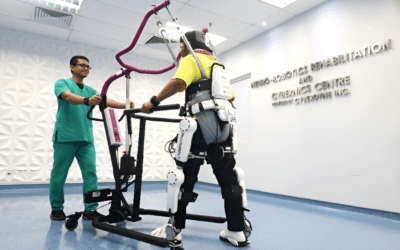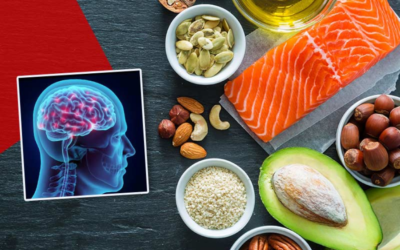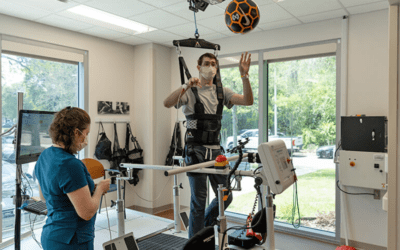Parkinson’s disease is a complex and progressive neurodegenerative disorder that affects millions of lives worldwide.
Experience the incredible Parkinson’s rehabilitation programmes at the PERKESO
Neurorehabilitation & Neuromodulation Centre in Malaysia! Our dedicated team understands the complex challenges of Parkinson’s disease and is committed to providing personalised rehabilitation programmes. With specialised exercises, innovative therapies, and unwavering support, we are here to help individuals regain control of their lives. Join us at our Parkinson’s rehabilitation centre, where we are a symbol of hope, supporting those facing the challenges of Parkinson’s with positivity and optimism!
Parkinson’s disease presents with a variety of motor symptoms, such as tremors, rigidity, slowness of movement (bradykinesia), and postural instability. In addition to physical difficulties, Parkinson’s can also impact emotional well-being and cognitive function. Though a cure is yet to be discovered, rehabilitation has become essential to managing the disease, improving quality of life and mobility, and instilling a sense of control.
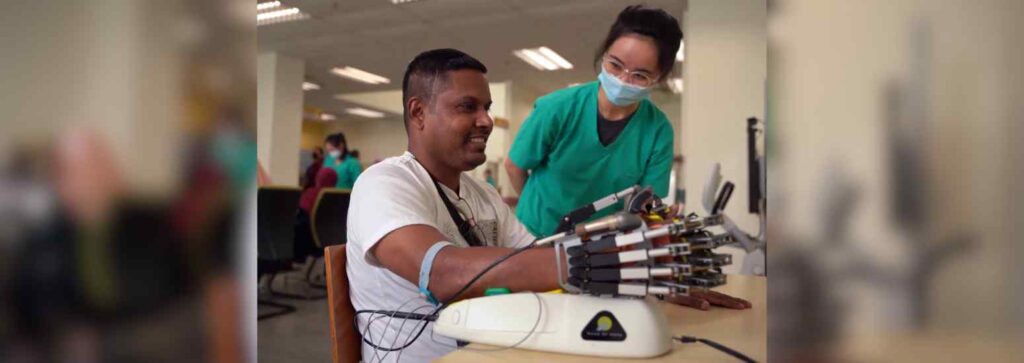
What is included in comprehensive Parkinson’s rehabilitation services?
At our Parkinson’s Rehabilitation Centre in Malaysia, we understand the challenges you may be facing. That’s why we offer a wide range of specialised services tailored to address various aspects of the disease.
Specialised Exercise Programmes for patients with Parkinson’s Disease:
Our proven Specialised Exercise Programmes significantly impact managing Parkinson’s symptoms. Our highly experienced physiotherapists work closely with patients to develop personalised exercise regimens that improve flexibility, strength, balance, and overall mobility. These meticulously designed exercises specifically target the motor challenges posed by Parkinson’s, empowering individuals to regain control over their movements.
Occupational therapy for patients with Parkinson’s Disease:
Occupational therapy is essential for empowering individuals with Parkinson’s disease to maintain their independence in daily activities. Our highly skilled occupational therapists work collaboratively with patients to develop effective strategies that make everyday tasks more manageable. By focusing on adaptive techniques and assistive devices, we confidently empower individuals to carry out their daily routines with autonomy and confidence.
Speech and Swallowing Therapy:
Parkinson’s disease can impact the musculature of speech and swallowing, resulting in communication challenges and an increased risk of aspiration. Our speech therapists utilise evidence-based methodologies to optimise speech intelligibility, enhance vocal modulation, and address swallowing impairments. These interventions foster improved communication and enhance nutritional uptake and overall quality of life.
Personalised Counselling and Emotional Support:
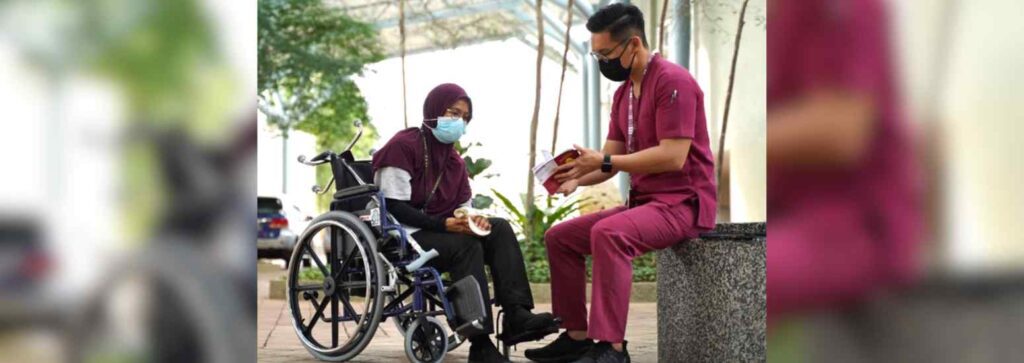
Managing a chronic condition such as Parkinson’s can have a significant impact on emotional and psychological well-being. Our team of certified counsellors provides a secure and supportive space for individuals and their families to address the emotional hardships often associated with the disease. We aim to augment overall resilience and mental well-being by furnishing coping strategies and emotional guidance.
Group Therapy for patients with Parkinson’s Disease:
Our group therapy sessions harness the power of community for individuals facing similar challenges. These sessions provide a platform for those with Parkinson’s to connect, share experiences, and learn from one another. We extend our impact beyond the rehabilitation process by fostering a sense of camaraderie, reducing feelings of isolation, and creating a supportive network.
Advantages & Benefits to patients with Parkinson’s Disease:
Engaging in organised Parkinson’s rehabilitation exercises provides numerous benefits that enhance the quality of life.
Motor Symptoms:
- Tremors: Uncontrolled shaking, often in the hands.
- Muscle Rigidity: Stiffness in muscles, leading to resistance during movement.
- Bradykinesia: Slowness of movement, making daily activities challenging.
Rehabilitation Techniques:
- Physical Exercises: Tailored exercises to improve muscle strength, flexibility, and coordination.
- Occupational Therapies: Techniques to enhance fine motor skills and improve daily living activities.
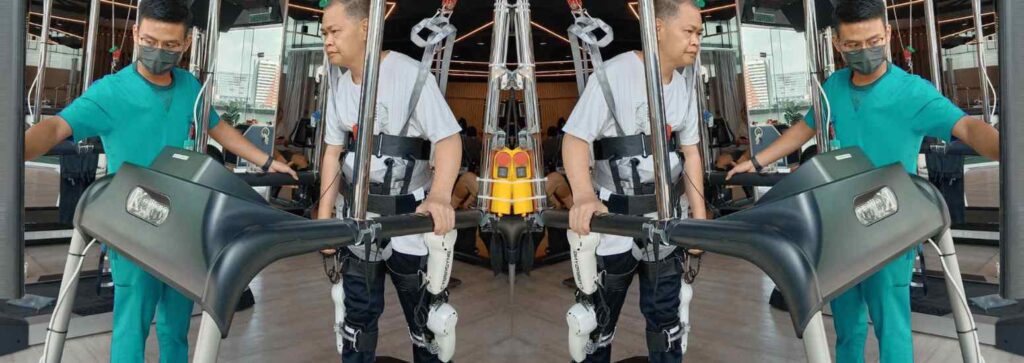
Benefits:
- Better Motor Control: Reduction in tremors and improved movement fluidity.
- Increased Independence: Enhanced ability to perform daily tasks independently.
Improved Confidence
Challenges:
- Frustration: Difficulty in performing simple tasks can lead to frustration.
- Helplessness: The progressive nature of the disease can cause feelings of helplessness.
- Decline in Self-Confidence: Loss of control over one’s body affects self-esteem.
Rehabilitation Focus:
- Physical Improvement: Visible progress in physical abilities.
- Mental Resilience: Strategies to cope with the disease’s challenges.
Benefits:
- Boosted Confidence: Achievements in rehabilitation foster a sense of accomplishment.
- Restored Control: Feeling more in control of one’s life through learnt strategies.
Emotional Well-being
Emotional Responses:
- Anxiety: Worry about the progression of the disease.
- Depression: Persistent sadness due to the chronic nature of the disease.
- Stress: Daily challenges and uncertainties add to stress levels.
Rehabilitation Services:
- Counselling: Professional guidance to address emotional challenges.
- Emotional Support: Structured support systems within rehabilitation centres.
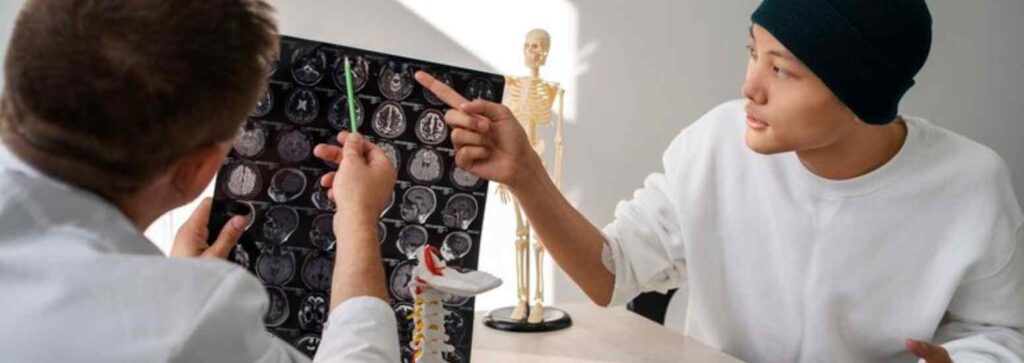
Benefits:
- Reduced Stress: Counselling helps in managing stress levels.
- Positive Outlook: Emotional support fosters a more optimistic perspective on life.
Cognitive Stimulation and Mental Agility
Cognitive Impact:
- Memory: Difficulty in retaining new information.
- Attention: Challenges in maintaining focus.
- Problem-Solving: Reduced ability to solve problems efficiently.
Rehabilitation Exercises:
- Cognitive Stimulation Activities: Puzzles, memory games, and problem-solving tasks.
- Memory Retention Strategies: Techniques to enhance memory.
Benefits:
- Maintained Cognitive Skills: Prevention of cognitive decline.
- Improved Cognitive Resilience: Enhanced ability to cope with cognitive challenges.
Pain Management
Physical Symptoms:
- Muscle Stiffness: Increased muscle tone causing discomfort.
- Discomfort and Pain: General discomfort in muscles and joints.
Rehabilitation Techniques:
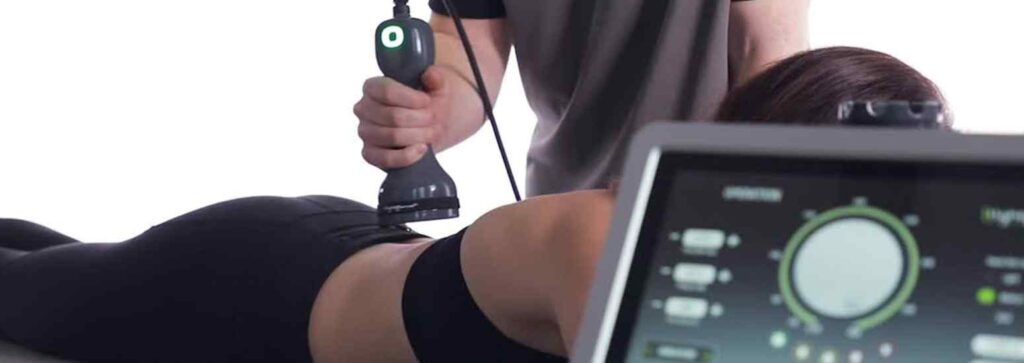
- Stretches: Exercises to enhance muscle flexibility.
- Massages and Manual Therapies: Techniques to reduce muscle tension.
- Overall Mobility Improvement: Activities to increase overall flexibility and movement.
Benefits:
- Reduced Pain: Alleviation of muscle tension and discomfort.
- Engagement in Daily Activities: Improved mobility allows for participation in daily activities with less strain.
Rehabiilitation with Minimal Medication:
Rehabilitation programmes are designed to complement medical treatments to support individuals with Parkinson’s. Regular exercise and therapies can improve muscle strength, balance, and coordination, leading to better drug absorption and distribution. This can result in more consistent symptom control and an overall enhanced sense of well-being.
PERKESO focus on Independent living:
An essential focus of Parkinson’s disease rehabilitation is to support individuals in preserving their independence for as long as possible. Participating in rehabilitation programmes allows individuals to gain valuable skills, strategies, and tools to continue daily activities and engage in social interactions without constant assistance. This sense of autonomy can significantly enhance their quality of life and ease the burden on caregivers and family members.
Why should you choose the PERKESO Neurorehabilitation & Neuromodulation Centre or Parkinson’s Rehabilitation Services in Malaysia?
Cheque out patient testimonials videos “Patient Testimonials“, which strongly recommend considering PERKESO Neurorehabilitation & Neuromodulation Centre for Parkinson’s rehabilitation services in Malaysia because:
Our Parkinson’s rehab centre has a team of experienced professionals specialising in Parkinson’s rehabilitation.
Rehabilitation with Advanced Technology Solutions:
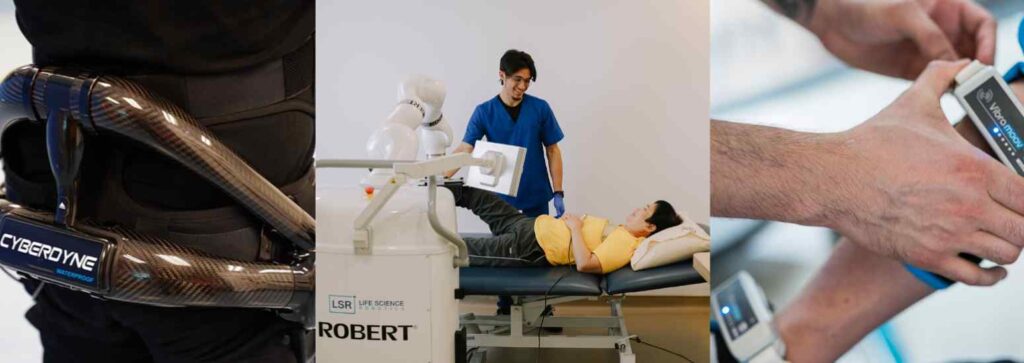
Deep Brain Stimulation (DBS) is a surgical procedure involving implanting a device that sends electrical signals to specific brain parts, typically a pacemaker-like device. DBS is commonly used as a treatment for Parkinson’s disease, a progressive neurodegenerative disorder that affects movement and motor functions.
Tailored Treatment Plans for Patients with Parkinson’s Disease:
The rising need for personalised and targeted therapy options has led to a growing adoption of Deep Brain Stimulation in the treatment of Parkinson’s disease. This innovative approach involves using implanted electrodes to deliver electrical stimulation to specific brain areas, offering personalised therapeutic benefits and improved symptom management for individuals with Parkinson’s disease.
We believe in treating the whole person, not just the symptoms. Our holistic approach encompasses physical, emotional, and mental well-being and AI-enabled data-driven solutions.
At PERKESO Neurorehabilitation & Neuromodulation Centre, we strongly emphasise compassionate and patient-centred care. We are committed to providing a supportive and nurturing environment throughout rehabilitation. Contact today to know more about Parkinson’s rehabilitation programmes in Malaysia.
Reference : Mayo Clinic, Celeb$ Fortune
Follow for more useful content – PERKESO Rehabilitation Centre

